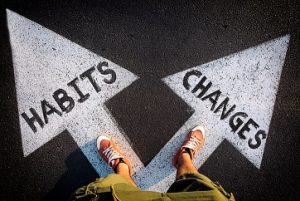Behavioral addictions with personal actions that lead to gratification in lieu of anxiety or depression. They are carried out to resolve some type of distress and temporarily can relieve the distress although the actions in themselves are not healthy or addictive due to extremity. Examples include sex, gaming, gambling, shopping or even binge eating. The issue lies in the extremity but also more so in the inability to stop or moderate. Some individuals later feel regret or embarrassment afterwards.
It is important to identify any type of behavioral addictions and question why they arise. Are they a poor substitute for coping over a deeper issue? Are they preventing one from facing that issue? Are there better alternatives than the addictive behavior? The temporary pleasure must be weighed with the overall physical and social health of the person. These behaviors can destroy relationships and make one hostage to a particular vice or habit.

It is hard to break bad habits, but with proper guidance, individuals can better control their impulsive decisions. Licensed counselors can help individuals identify triggers to these behaviors and how to learn to form better and healthy habits.
The article, “Behavioral Addictions, Emotions, And The Brain” by Krystina Murray looks closer at how behavior addictions exist within the human brain and how to better face them. She states,
“According to Science Direct, behavioral addictions are defined as, “an intense desire to repeat some action that is pleasurable or perceived to improve wellbeing or capable of alleviating some personal distress.” What classifies some behaviors as addictive is the difficultly those affected have with stopping or reducing their participation in it. ”
To read the entire article, please click here
Please also review AIHCP’s Substance Abuse Practitioner Program and see if it matches your academic and professional goals. The program is online and independent study and open to qualified professionals looking for a four year certification dealing with substance abuse counseling.
